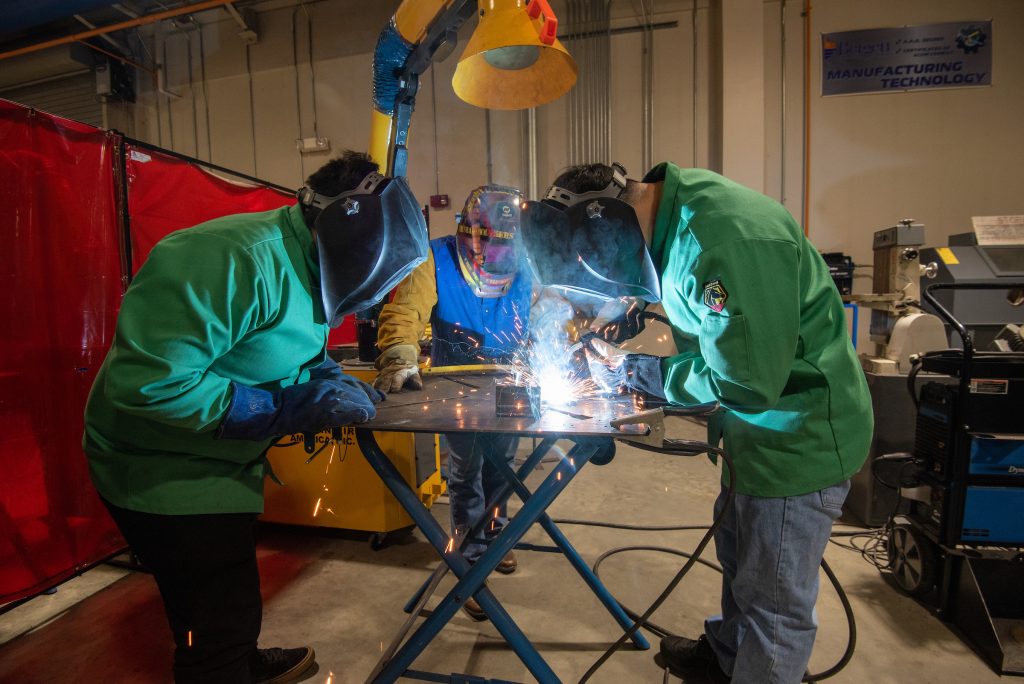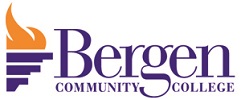Find your path to success with a diverse range of more than 120 degree, certificate, and continuing education programs.

The community college seeks to ignite the region’s recovery.
PARAMUS, N.J. – When it comes to the region’s economic recovery from the COVID-19 pandemic, Bergen Community College President Eric M. Friedman, Ph.D., wants the community to know “Bergen means business.”
“At the peak of the COVID-19 pandemic, New Jersey’s unemployment rate reached nearly 15 percent and key industries central to New Jersey’s economy, including hospitality, entertainment, logistics and manufacturing, practically screeched to a halt,” he said. “But now it’s time for a comeback – ‘Jersey-style’ – stronger and more resilient than before.”
During his first six months as president of the state’s No. 1 college for associate degree graduates, Friedman has prepared the College to lead the region’s recovery from the pandemic through new partnerships, programs and initiatives. Central to this work, Friedman convened a special task force – the Bergen Community College Economic Recovery Committee – charged with creating and implementing strategies that will continue to position the institution as a catalyst for recovery. The group of strategic thinkers that features faculty and College leaders, began meeting in late April. The committee serves in an advisory capacity to the president, providing recommendations on programs and services and developing ideas centered around removing barriers to employment. Representing an academic institution, committee members will also identify career pathways that lead to meaningful employment, placing the College at the center of these efforts. As the committee begins to expand the College’s connections with business, industry, government, labor and nonprofit entities, each meeting features invited guests from these key sectors.
“The committee really takes the College’s positioning as an engine for economic development and puts that work into overdrive,” Friedman said. “We recently welcomed Bergen County Workforce Investment Board Executive Director Tammy Molinelli to a meeting, which helped amplify how critical the County of Bergen remains as a driver of economic activity. I’m grateful that our Bergen County government partners have embraced the opportunity to collaborate on the institution’s economic development work.”
In an example of this collaboration, county government officials helped connect the College with executives from Volvo Car USA, who then selected faculty and students from Bergen’s hotel and restaurant management program to fully operate the company’s corporate café at its national headquarters in Mahwah. The College’s hotel and restaurant management programs prepare students for careers in the leisure and hospitality industry – one of New Jersey’s nine key employment sectors. Bergen’s academic offerings in these areas include culinary arts, hospitality and events planning.
“The Volvo partnership, which came to our attention through the office of Bergen County Executive James J. Tedesco III, represents the best of how the College can assist an industry partner,” Friedman said. “It’s incredibly special to watch Bergen students preparing meals at one of the world’s most recognizable motor vehicle brands – and hearing rave reviews from those who work at the corporate headquarters.”
Also related to culinary education and the College’s relationships in the community, the hotel and restaurant management discipline faculty recently hosted an advisory committee meeting featuring industry heavy-hitters such as Alex LaPratt, of Atrium DUMBO, Beasts & Bottles, Jean Georges, NYC; French Laundry, Ca.; Christopher Struck, the beverage director of ilili Restaurants; and Laurie Hamm, the owner of the Ho-Ho-Kus Inn & Tavern. The conversation, which focused on issues such as human resource management, purchasing and finances, will assist the department in adjusting its curricula to better prepare students for the post-pandemic workforce. College officials and faculty rely on this feedback on trends, challenges and opportunities that the College can then implement into its coursework.
“It’s these relationships that make the College’s programs so unique – we’re able to put students in an environment that mirrors what they’ll see in the workforce before they even leave our campus,” Friedman said.
To wit, the College’s signature health professions programs stand at the top of the list when discussing Bergen creating pipelines to employment. Supported through the Building Our Future Bond Act, the College opened the region’s only Health Professions Integrated Teaching Center five years ago. The three-story facility features a dynamic medical simulation lab, a dental hygiene clinic and other learning spaces that maintain the same equipment as the region’s best healthcare facilities.
“Healthcare has remained at the center of all of our lives during the last 17 months,” Friedman said. “To take it a step further, it’s the nurses, respiratory therapists and paramedics who have stood on the front lines and become some of the most visible and valued members of our local community. Even before the pandemic, healthcare represented the No. 1 employment sector in Bergen County, but COVID-19 raised the bar even higher. The College educated the generation of healthcare professionals who led us through the pandemic – and we’re educating the next generation right now who will take care of us in the future. As the demand for healthcare professionals grows stronger, Bergen will continue to help ‘take care’ of the county’s future by providing the high-quality education and training expected by the region’s top healthcare employers.”
STEM education also represents one of Bergen’s major pipelines to industry – punctuated by the nation’s only STEM Student Research Center of its kind at a community college. In addition to county chapter 12 funds, the U.S. Department of Education and Emil Buehler Perpetual Trust helped support the construction of the $1 million research center, which features large “showcase” windows that enable observation from outside the center, a drones/robotics wing, a MakerSpace and mini-course classroom. More than 2,000 students take advantage of programs such as engineering science, computer science and biology while completing research projects in- and outside the classroom. Projects have included converting a softball field house into a workshop, high-altitude balloon launches, retrofitting a gas combustion truck and motorcycle into electric vehicles and conducting experimental testing with wind turbines and solar panels.
Meanwhile, and also as part of the multifaceted strategy to position the College as a central partner to government, industry and labor as the state emerges from the pandemic, Bergen joined with the New Jersey Business and Industry Association to cosponsor Bergen County’s “employer legislative committee” (ELC). The events, which have taken place since 1959 in all of the state’s 21 counties, provide an opportunity for members of industry, labor and government an opportunity to network, discuss emerging topics and receive briefings from NJBIA on legislative and regulatory issues affecting employers. President Friedman and President and CEO of the Meadowlands Chamber of Commerce Jim Kirkos now chair the Bergen County ELC.
Finally in recent months, Bergen’s Division of Continuing Education and Workforce Development has launched a comprehensive apprenticeship program that offers jobseekers opportunities in healthcare and manufacturing with pipelines to employment – and a paycheck while learning on-the-job skills at major employers such as CVS, CareOne and Hackensack Meridian Health.
“It’s pretty simple: apprenticeships pay off,” Friedman said. “They work for both the employer and the student/employee.”
With the College ready to stand as the center of the region’s recovery, Friedman led the full reopening of campus facilities this summer. The College’s revised reopening plan includes offering courses both in-person and online during the upcoming summer and fall semesters, reopening campus resources and allowing faculty and staff to return to their offices after more than a year of operating via a mostly remote instructional and professional environment.
“I say with great enthusiasm that it’s time to come back to Bergen,” Friedman said. “We look forward to providing students with the opportunity to return to an on-campus environment where they can learn, socialize and enjoy a comprehensive collegiate experience. Additionally, we will continue to follow the best practices recommended by health officials in order to safely reopen our campus. I’m incredibly proud of our work during the pandemic that prevented any cases of community spread among those who remained on campus.”
For families and students unsure of their plans for higher education due to the pandemic, Bergen’s affordable tuition and renowned faculty complement general education classes such as English Composition, General Biology and Statistics that remain ideal for transfer to many four-year colleges. Bergen offers more than 130 degree and certificate programs in areas such as aviation, criminal justice, dental hygiene, fashion design and hospitality. Students considering enrolling at the College should first file their Free Application for Federal Student Aid (FAFSA). Filing a FAFSA can help students become eligible for programs such as the state’s tuition-free Community College Opportunity Grant, which has now expanded to include households making up to $65,000 per year, and other tuition assistance programs.
The College has also frozen tuition rates at last year’s levels and offered students the opportunity to apply for stimulus funds awarded through the institution and federal government. Students interested in receiving more information on Bergen can visit the College’s website at Bergen.edu.
Based in Paramus, Bergen Community College (www.bergen.edu), a public two-year coeducational college, enrolls more than 24,000 students at locations in Paramus, the Philip Ciarco Jr. Learning Center in Hackensack and Bergen Community College at the Meadowlands in Lyndhurst. The College offers associate degree, certificate and continuing education programs in a variety of fields. More students graduate from Bergen than any other community college in the state.
# # #
